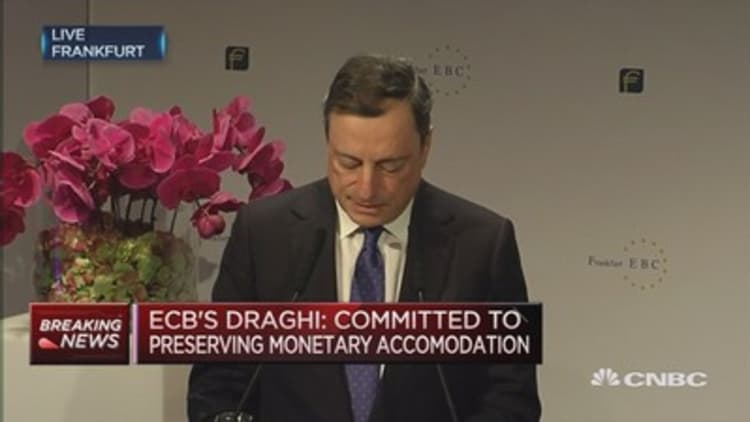
The President of the European Central Bank has highlighted his concerns over how much the region's economies rely on accommodative monetary policy.
Mario Draghi told the European Banking Congress in Frankfurt that the recent increase in prices is mainly driven by the low financing conditions, and as such, the ECB is ready to continue with the current monetary policy stance.
"Despite the uplift to prices provided by the gradual closing of the output gap, a sustained adjustment in the path of inflation still relies on the continuation of the current, unprecedented financing conditions," he said.
"It is for this reason that we remain committed to preserving the very substantial degree of monetary accommodation, which is necessary to secure a sustained convergence of inflation towards level below, but close to, 2 percent over the medium-term," Draghi said.
The ECB began its quantitative easing programme in January of 2015 and it is set to expire in March 2017. However, analysts are expecting the central bank to announce an extension in QE when it meets next month.

According to Draghi there are three other main risks to growth: geopolitics, banks' profitability and weakness in inflation dynamics.
"We cannot be sanguine over the economic outlook," the president of the ECB said.
"Even though the euro area banking system is today more resilient, its profitability remains a challenge…One of the factors weighing on profitability is the low growth and low inflation environment, which translates into lower levels of policy interest rates. But legacy and structural challenges are also at play, which banks and policymakers can and should address," Draghi said.
The central bank has often asked banks and government to deal with the high-level of non-performing loans in bank's balance sheets. In Italy, officials have implemented a "bad bank" to deal with NPL's, but in countries, such as Portugal, works in this area are still ongoing.
To ensure that the 19-member bloc sees further growth, Draghi defended a full-implementation of regulatory frameworks on banks.
"So now is the time to finalise the regulatory agenda and enter a period of stability. The focus should be on implementation, not on new design."
An account of the last monetary policy meeting in October, published Thursday, showed that the central bank continues to be concerend over the economic outlook of the euro area and seems ready to keep its asset purchase programme.
"As regards risks to the recovery, it was highlighted that, besides political uncertainties, further downside risks stemmed from remaining balance sheet weaknesses in the euro area financial sector," the account reads.
"Members also recalled that the outlook for a continued cyclical recovery was based on exceptionally supportive financing conditions,which benefited to a large extent from the ECB's monetary policy measures," the account also read.


